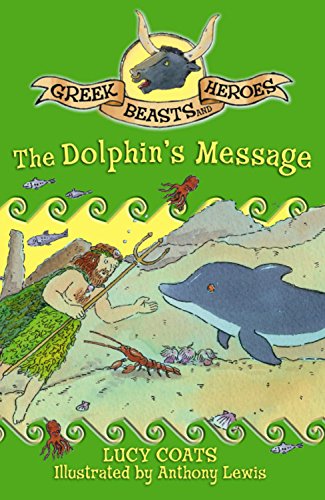Greeks, Beasts and Heroes: The Dolphin’s Message
Lucy Coats’ fourth book of Greek myths is a potpourri collection. There are three tragic tales, the first of which, The Terrible Feast, is, perhaps, the most dramatic. Tantalus invites the gods to a feast. Hoping to impress them with something new, he kills his son, Pelops, and serves him up as a casserole. The Runaway Sun tells the story of Phaëthon, who tries to drive his father Helios’ sun chariot across the heavens, loses control, and is killed by one of Zeus’s thunderbolts. In The Sharp-eyed King, Sisyphus unwisely tells tales on Zeus. We are told that he lives to regret it but not what revenge Zeus took – which is odd, considering how dramatically unpleasant it was.
There are a couple of stories which explain the origin of various astronomical features. In The Starry Hunter, Orion the Hunter arouses the jealousy of the god Apollo. In the title story, The Dolphin’s Message, the dolphin, Delphinus, hides Princess Amphitrite from her unwanted suitor, the god Poseidon. Both Orion and Delphinus are later turned into constellations.
There are two stories of divine births. The Bee of Wisdom recounts how the goddess Athene came to be born from the head of her father, Zeus, and her subsequent competition with Poseidon, the god of the sea, as to who should rule Athens. The Secret of Wine tells of the birth of the wine god, Dionysus, born in equally dramatic circumstances.
There is a prequel to the Theseus and the Minotaur story in the third collection. The Robber’s Bed covers the birth of the hero, Theseus, and one of his early adventures, that of defeating the robber Procrustes. As always, Anthony Lewis’s illustrations deserve a special mention. Unfortunately, Dionysus is still spelt incorrectly.
Elizabeth Hawksley
I think it was really good. I liked how in The Starry Hunter, the best hunter’s friend threw the best hunter in the water and he was carried so that he could stand on the sea. I liked how the scorpion was bigger than the man. I liked the chariot in the sky being the sun. I liked the pictures in the book: there are shells and things on each page. I didn’t like the wasp being made a slave because the wasp looks really sad. I also didn’t like it where the man stewed his own son for a meal with the gods; it was a bit mean and sad. I liked this more than the first book. I think 7 is the right age to read this book.
Louis McNulty, Age 7










